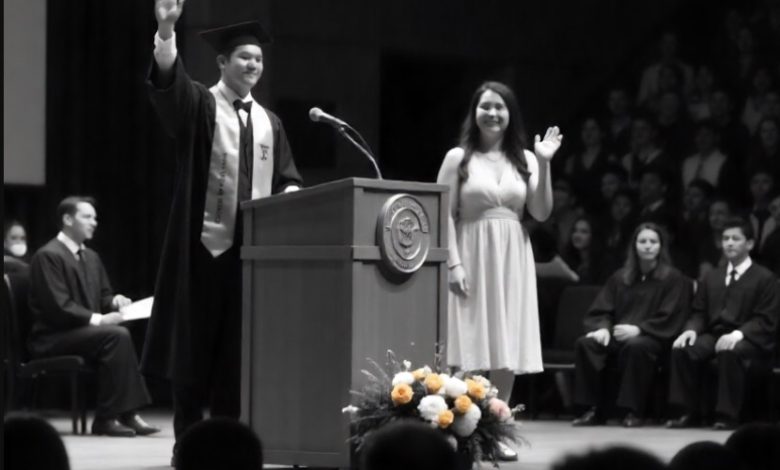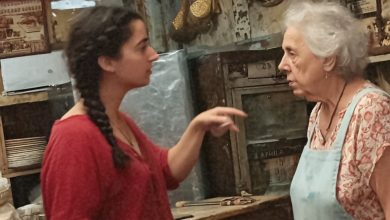A tired mother arrived at the ceremony, and her son’s speech shocked everyone.

At Jeremiah’s graduation ceremony, the auditorium was buzzing with excitement. Families filled the seats, flowers and balloons brightened the air, and proud parents wiped away tears as they watched their children prepare to step into a new chapter of life. Among the crowd, a woman walked in quietly, her steps heavy as though she had carried the weight of years on her shoulders. She was Esther, Jeremiah’s mother, and she looked as if she had just lived through a long, exhausting day. Nobody knew the truth of what had happened to her on the way to the event. But when her son stood before the microphone, what he said changed the room forever.
Esther had been alone since before Jeremiah was born. Her husband passed away while she was still pregnant, leaving her to raise her only child with nothing but courage, determination, and the meager income she made selling homemade sweets on the streets of Houston. It was not an easy life—long days under the hot sun, rainy afternoons with few customers, and countless nights when she went to sleep worrying if tomorrow would be any better. Yet, through it all, she never stopped fighting. Her love for Jeremiah was her shield, her only protection against despair.
Every morning before school, Jeremiah would plead with her. “Mom, please let me help you. Just a few hours after class. I can sell candies too. I want to make things easier for you.”
But Esther always shook her head gently, wiping flour-dusted hands on her apron and smiling at him with tired but determined eyes. “No, my son. Your job is in that classroom. You build your future with books, and I’ll build it with these hands. That’s how we win. Now go.”
Jeremiah obeyed. He knew his mother carried more than her share, but he also understood that her sacrifices came from love. A brilliant student, he had earned a full scholarship to one of the most prestigious private schools in the city. On paper, he belonged there. But in reality, the environment was harsh. Most of his classmates came from wealthy families, with new clothes, luxury cars, and the latest phones. Jeremiah, with his old tablet and worn shoes, was a target for cruelty.
“Hey, scholarship boy,” Wyatt, one of the rich kids, sneered one morning in the hallway, waving his new phone. “Still using that brick of yours? Maybe ask your mom to sell more candy.”
Another, Miles, laughed and added, “Or maybe she needs that money just to eat.”
Jeremiah felt his face burn with shame, but his voice stayed steady. “My mother is the strongest person I know. You’re not even worthy to say her name.”
His words silenced them for a moment, but the bullying never stopped. Later, Jeremiah would hide in the bathroom, locking himself inside a stall, letting silent tears fall. He clenched his fists, whispering to himself, I will make all this worth it. I promise you, Mom. He never told Esther about the insults and humiliation. She had enough burdens already, and he swore he would protect her from the cruelty of his world.
The day of graduation finally came. Jeremiah woke up nervous but excited. As the class speaker, he knew it was a moment of honor, and he wanted his mother to be proud. He dressed carefully, adjusting his tie as though every detail was a promise to her.
Meanwhile, Esther was preparing for the event in her own way. For months, she had saved every spare penny, skipping small comforts and meals, just to buy a simple but beautiful white lace dress and a pair of dark red shoes. She even went to a salon, something she rarely allowed herself, and got her hair and makeup done. Looking in the mirror, she hardly recognized herself. She didn’t see the tired street vendor anymore—she saw a proud mother, ready to watch her son shine.
On her way to the ceremony, her heart felt light for the first time in years. But then, fate intervened. Miles and Wyatt, walking with arrogance and mischief in their eyes, spotted her.
“Well, look who it is,” Miles smirked. “All dressed up. Where did a street vendor get a dress like that? Did you steal it?”
Wyatt’s laughter was sharp. “Yeah, a candy seller can’t afford that. Must be fake.”
Esther’s voice trembled, but she held her head high. “You are mistaken. I worked hard to be here today. This is my son’s day, and nothing you say will take that from me.”
But they weren’t finished. As she approached the school, Miles spotted a bucket of muddy water left nearby. With a cruel kick, he sent it splashing onto Esther, drenching her white dress in filthy stains. She stumbled, falling to the ground. Tears filled her eyes as she whispered, “Why? Why would you do this?”
The boys laughed and walked away, leaving her broken on the street. For a moment, Esther wanted to go home, to hide her shame. But the thought of missing Jeremiah’s graduation crushed her. So, with her ruined dress clinging to her, she gathered her strength and walked inside, slipping into a seat in the back corner, hoping no one would notice her.
When Jeremiah looked out at the crowd, his eyes searched eagerly for his mother. But when he finally spotted her—alone, her dress ruined, her face streaked with mud and sorrow—his heart shattered. He rushed to her side, whispering, “Mom, what happened?”
“Two boys… Miles and Wyatt,” she said softly, her voice shaking. “They humiliated me.”
Jeremiah’s eyes hardened with fury. He had endured their cruelty in silence for years, but now they had touched the one person he loved most. This was something he could not forgive.
He returned to the stage, his prepared speech crumpled in his hand. He faced the audience, his voice clear and powerful. “Good evening. I had a speech ready for tonight, but after what happened today, I cannot pretend everything is fine. I must speak the truth.”
The room grew still.
“The most important lessons we learn are not written in books. They are about character, dignity, and courage. That is why I want to invite my greatest teacher—my mother, Esther—to stand with me.”
The crowd murmured in surprise as Esther hesitated, but Jeremiah’s gaze urged her on. She stepped onto the stage, her muddy dress a painful symbol of her struggle. He took her hand and continued.
“My mother raised me alone. She sold sweets on the streets, under the sun, in the rain, never stopping, so that I could have a chance at a better life. Every success I have belongs to her. But today, on her way here, she was humiliated by two of our classmates—Miles and Wyatt.”
Gasps filled the room. Parents and students turned, shocked, as Jeremiah stared directly at the two boys.
“I endured their bullying in silence for years, but silence only feeds injustice. Today, I stand for my mother. She is the bravest, strongest person I know, and I will never let her sacrifices be dishonored again.”
The room erupted into applause, the audience rising to their feet. Esther wept quietly, overwhelmed by the love and pride radiating from her son.
In the days that followed, the story spread quickly. Miles and Wyatt’s families faced shame and anger from the community. Their privileges were stripped away—cars, vacations, allowances—all gone. But that wasn’t the end. Jeremiah filed a legal case against them, determined to seek justice.
In court, the evidence and testimonies painted a clear picture of cruelty. The judge’s words were firm. “This was not a harmless prank. It was an act of humiliation with real consequences.” Miles and Wyatt were sentenced to six months in prison and ordered to pay compensation for the emotional damage.
Behind bars, the arrogance drained from them. Night after night, they whispered regrets. “We thought we were untouchable,” Wyatt admitted. “I’d give anything to take it back,” Miles murmured.
Six months later, when they were released, they sought out Esther. They found her in a small café—a new business Jeremiah had helped her open with the compensation money. She was no longer the street vendor they had mocked. She was a woman restored, her dignity shining.
They bowed their heads, voices shaking as they apologized. “We are truly sorry for what we did to you,” Wyatt said. “We regret it every day.”
Esther studied their faces for a long moment. Finally, she said, “What you did was cruel. But if your regret is real, I can forgive you.”
Jeremiah, standing beside her, looked at them with suspicion, but as he saw their sincerity, his anger softened. “I hope you’ve truly learned,” he said quietly.
It was the start of healing. For Jeremiah, justice was no longer just about punishment—it was about protecting his mother’s dignity and living the values she had taught him: strength, respect, and compassion.
That day at graduation, when his voice filled the auditorium, Jeremiah not only defended his mother—he gave her the honor she deserved, and together, they began a new chapter of life, stronger than ever.










